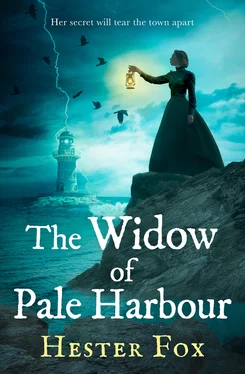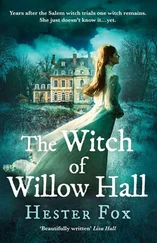They moved along the wall as she pointed out some of her finer pieces, transfixed by the animation in his eyes as she discussed the merits of each.
He stopped in front of a small-framed article, illustrated with a lithograph, and nodded toward it. “Was your husband a writer?”
Pressing her lips together, she paused before answering. Why were men always so quick to attribute accomplishments to other men? “He owned a magazine,” she said. “That was Nathaniel’s one great kindness—he left me his magazine when he died. This was the front page from the first printing I oversaw as owner and submissions editor.”
He peered closer at the yellowed paper under glass and looked up at her in surprise. “What, you own Carver’s Monthly ?”
“The one and only.”
He gave a long, low whistle and rocked back on his heels. “Damn.”
She raised a brow at the unexpected profanity, and he immediately colored. “Sorry. Only that I used to read it every week.”
“Then you have exceedingly good taste,” she said with a broad smile, finding herself unable to take offense. “It’s funny how for all their distrust of me, as soon as the townspeople think I can help them with something, they’re more than happy to put aside their prejudice and knock on my door. Just last month, Jasper Gibbs came to me with a volume of stories he had written, asking me to publish them in the magazine.”
“And did you?”
“Goodness, no. They were awful.”
Sun was coming through the windows in a low, hazy slant. They sat back down as the clock in the corner struck three. He’d been in her parlor for almost an hour, and though he was quiet, he was a good listener and she found herself wishing he would stay for hours more.
But before she knew it, he was rising to his feet and setting aside the tea, which he had hardly touched. “I’m afraid I’ve imposed on your hospitality long enough.”
“You did no such thing,” she said, trying not to let her disappointment show. “As you can imagine, visitors are few and far between, and I always welcome good conversation.”
Her hand paused on the doorknob before she released him out into the chill evening. “Do come again, Reverend. I believe we have much more to discuss.”
Gabriel emerged from the house in a haze. Nothing was as it seemed. Dark, abandoned churches in the middle of a roof-shaking thunderstorm didn’t scare him, but the erudite widow thinking him simple horrified him. Damn, but he had made a fool of himself when he had sat in her dead husband’s chair. Of course she wouldn’t want a hulking man like him breaking a beloved relic. She had seen right through him, he was sure of it, saw his charade, his roughness, his deficiencies. It was as if she could read every piece of ugly gossip in the town printed on his face.
There had been something comforting and cozy about the room, not to mention the enigmatic woman who had sat across from him, her silver eyes trained on him as if he were the most interesting person in the world, her smile as warm and honey-mellow as the late-afternoon light. And those hands, those lovely hands. He could no more imagine them taking the life of a man than he could them snapping the necks of birds and building a macabre altar in an abandoned church. He felt a sudden rush of guilt for even entertaining the idea that she could have been responsible for such a thing.
The sun was sinking fast, and the cold air roused him from his reveries. He looked up to find the other woman, Helen, standing on the front path. She was holding something black and sleek in her arms. Was that... Was she holding a bird?
As he grew closer, he saw it was a raven. It was large and sleek, and apparently docile. As carefully as if she was cradling a newborn, Helen crouched down and let the raven hop from her hands. There was something wrong with its leg, and it bobbled uncertainly before gaining its balance and pecking at the ground.
The crunch of gravel under Gabriel’s shoes gave him away. Helen stood back up, her expression turning stony as she watched him approach.
“Helen, was it?” Perhaps she could answer the questions that Gabriel had been too diffident to ask Mrs. Carver.
She scowled, an expression that he would have thought permanent on her face, if he had not seen her light up when Mrs. Carver spoke to her. He kept one eye trained on the raven; could it be one of those he had seen his first night in the church?
“You’ll forgive me for asking, but do you know about all the dead animals, the strange things that people have been finding around town?” The tack might have been too direct, but he had nothing to lose by asking her; she already clearly disliked him.
Helen gave him a measured look, answering him slowly, as if he were a small child. “I know that folk like to make a fuss out of nothing.”
“But you work for Mrs. Carver...you don’t share their opinion of her?”
In an instant, the closed, suspicious look evaporated from her face, and her dark eyes misted. “Never,” she said. “Sophy saved me.”
“Saved you?”
“That’s right,” she said, jutting her chin.
“How do you mean?”
Helen heaved a sigh and crossed her arms. “If you must know, after my husband left, I ended up in the poorhouse.”
She was staring at him with unnerving intensity. “I’m sorry to hear that,” he said.
Her scowl deepened. “I don’t need your pity. She took me on as a housemaid, and I haven’t left her side ever since. We saved each other,” she said, her eyes frighteningly bright.
“Saved each other?”
“You wouldn’t understand,” she snapped at him, apparently done with her nostalgic reminiscing. “Now, if that will be all?”
She didn’t give him a chance to respond before she was scooping the raven back up and briskly making her way to the house.
Gabriel walked slowly back toward the road, Helen’s story swirling in his mind. He could picture the gentle and elegant Mrs. Carver, basket on her arm, leaning over women in their sickbeds in the poorhouse and doling out comforting words. But good God, what was he missing? How could that same woman be painted as a witch, a murderer?
When he reached the gate, he stopped and glanced up to the windows, but again, no face stared back down at him.

Helen stood in the carriage house window, watching the interfering minister finally turn and leave the grounds. She let out a breath.
What right did he have to come in here, dredging up painful memories and upsetting Sophronia? Sophy would never say as much, of course, but Helen could tell that the visit had taken its toll on her.
The raven let out a soft squawk in her arms, and she absently stroked its head. She still remembered the day Sophronia had come to the poorhouse. She had been like an angel with her bright blue dress and ready, sympathetic smile. She’d come armed with charity baskets for the women, God bless her soul. When she passed by Helen’s bed, she’d asked her in the kindest, gentlest voice what ailed her. Helen had told her it was a chest complaint, though in truth it was so much more than that. It was a broken spirit from being abandoned by the man who had sworn to protect her, a broken heart for the children she would never have.
Sophronia had come back the next day with a bottle of medicine. Helen had taken her hand to thank her, and it was then that she knew that their destinies were intertwined. She felt something pass between them, like a flame leaping from the match to tinder. When she was well enough to leave, Sopronia had taken her on as a maid, and since then they had grown as close as sisters, as dependent on each other as mother and child. But no matter how close they were, Helen knew from experience that pretty words and promises were not enough.
Читать дальше












![Helen Rowland - The Widow [To Say Nothing of the Man]](/books/752764/helen-rowland-the-widow-to-say-nothing-of-the-man-thumb.webp)
